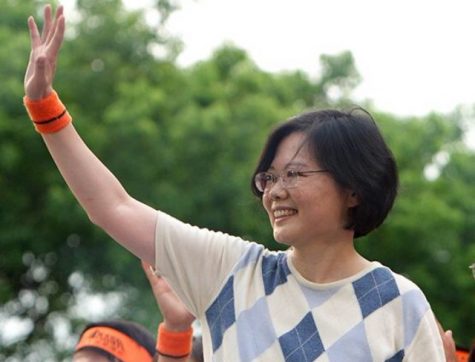Terrible Times for China and Taiwan

On January 4th, after claiming to be committed to promoting peace in Asia, China sent its only aircraft carrier, the Liaoning, through the waterway that separates the mother country from its self-governed nation. In response to the military threat, Taiwan deployed fighter jets, a surveillance aircraft, and Navy frigate in preparation as the Liaoning neared the island that is under the rule of the Republic of China. According to BBC News, China was participating in a training exercise, the aircraft carrier completed its passage through the Taiwan Strait by Thursday, January 5th.
Although these countries are halfway across the world, the Unites States plays a very large role in the Taiwan and China tension. While the U.S. and Taiwan broke diplomatic ties in 1979, The U.S. has continued to be Taiwan’s only ally since World War II. After Trump broke a decade long diplomatic tradition by speaking on the phone with Tsai Ing-wen, the Taiwanese leader, tensions between China and Taiwan increased. According to New York Times, instead of going through China-US communiques, U.S. President Donald Trump spoke directly over the phone with Taiwan President Tsai Ing-wen. During this call, which is described as a “shenanigan by the Taiwan side” by the Chinese foreign minister Wang Yi, Trump and Tsai Ing-Wen discussed promotion of the domestic economy and strengthening national defense, while briefly discussing Taiwan’s political situation.
After the call, China urged that Taiwanese delegations be banned from Donald Trump’s inauguration ceremony, despite both the United States and Taiwan president stating the main purpose of the call was to congratulate each other on their political success, as Tsai Ing-Wen was elected president earlier this year. However, after the call, President Trump revealed he believed the One China policy was currently under negotiation, angering leaders in Beijing. According to CNN, although its length was only about ten minutes, this phone call could hurt healthy U.S. and China relations, as the One China policy is the foundation of China-US relations, per Minister Wang Yi.
Despite the U.S. acknowledging Taiwan as under China’s rule in the United States’ One China Policy, the diplomatic acknowledgement of China’s position that there is only one Chinese government, Taiwan considers itself to be an independent nation. This call for independence has been a major contributor to the tension between China and Taiwan. Taiwanese citizens have held countless protests calling for Taiwan to gain independence from China, who has ruled the island for more than 300 years. According to BBC News, these independence movements threaten the One China policy, which has been around since the end of the Chinse Civil War in 1949. Although Taiwan’s independence protests had been expected to slowly come to a stop, there are still many activists pushing for Taiwan to become independent, and tensions between China and Taiwan have only increased. While the tension between China and Taiwan has increased significantly lately, CNN analysts believe China discharging the Liaoning through the Taiwan Strait should not be viewed as a violently provocative move.
However, it is not only the governments that are taking part in this international feud. Citizens of each country have gotten spiteful with each other as well. According to New York Times, a South Korean Popstar received so much backlash from China after posing with a Taiwan Flag, she had to make an apology on air to fans. Chou Tzuyu, a member of the K-pop band Twice, was given a small Taiwan flag to pose with while appearing on South Korean TV show, as the star was born and raised in Taiwan. However, this small act of patriotism led to Tzuyu being labeled as a pro-independence activist, leading to very negative responses from Chinese audiences. Tzuyu not only lost an endorsement deal with a Chinese Smartphone company, her name was forbidden on Chinese social media. Tzuyu expressed her anguish through a video apology, in which she expressed her pride being Chinese, and her belief in one China.
Despite the long-lasting tension between the territories of the Republic of China, Taiwan’s president believes in a new era of peace between Taiwan and China. President Tsai believes warfare will not solve anything, and believes communication is needed for both countries to come to an understanding regarding Taiwan’s political status. According to International Business Times, in a letter to Pope Francis on January 5th, President Tsai stated she aspired to keep peace, and she is committed to “enhancing the well-being of the Taiwanese people and creating a new era for cross-strait peace.” While China has yet to comment on President’s Tsai aspirations for peace, her actions may represent a turning point in the decade’s old tension between Taiwan and China.





